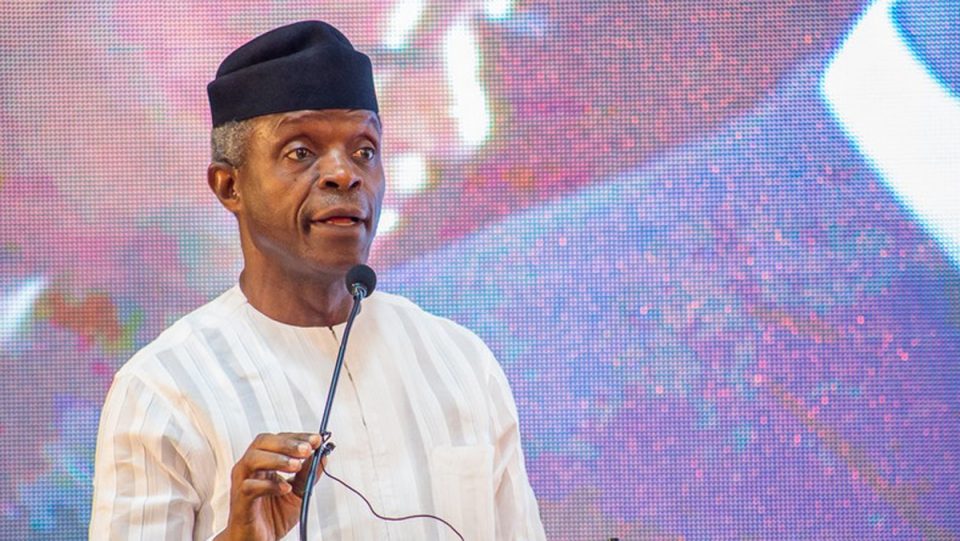Vice President Yemi Osinbajo, on Friday called for synergy among stakeholders, well-meaning Nigerians, and government agencies in the fight against corruption in the country.
Osinbajo, represented by Mr Dayo Apata, Solicitor General of the Federation made the call at the launching of the Second Survey (December 2019) on corruption as experienced by the population with the title `Corruption in Nigeria: Patterns and Trends’ by the United Nations Office on Drugs and Crime (UNODC).
The survey was conducted in close collaboration with the National Bureau of Statistics of Nigeria, UNDOC, and the UK.
He stressed the need for stakeholders to improve the understanding of corruption in different manifestations, and to also develop evidence-based anti-corruption policies and measures to curb the menace.
Speaking also, Sen. Suleiman Abdu-Kwari, Chairman, Senate Committee on Anti-Corruption and Financial Crimes, said that the first survey revealed that corruption was more prevalent in certain sectors, with the police and judiciary being the more susceptible.
Abdu-Kwari added that the findings indicated that one of the effects was the difficulty many experienced in accessing justice through “our criminal justice system”.
“The Nigeria Police Force and the judiciary are at the vanguard of fighting graft in the country, and was then implied that in-house reforms were needed in these sectors.
“The other sectors like Power, Health and Education were areas where the first survey indicates critical attention was needed, as they had direct impact on the socioeconomic lives of the average Nigerian.
“In recent times our electoral processes have also witnessed episodes of corruption, including vote-buying.
“The EFCC had deployed their personnel during the last electoral cycle in this regard and some successes were recorded.
“As part their oversight duties and in furtherance to the above, we will also be holding the Anti-Corruption Agencies and anti-corruption service providers established by accountable,” he said.
Responding, Oliver Stolpe, UNODC Country Representative said that cash had continued to be the dominant form of bribery, adding that 93 per cent of bribes in 2019 were paid in cash, a slightly larger share than in 2016.
According to him, the report on the 2019 survey shows the average cash bribe paid was N5, 754, a sum equivalent to roughly $52 in Purchasing Power Partly (PPP).
“Overall, it is estimated that a total of roughly N675 billion was paid in cash bribe to public officials in Nigeria.
“The economic cost of bribery becomes even more palpable when considering that, on average, bribe-payers pay an amount equivalent to six per cent of the average annual income of Nigerians.
“The prevalence of bribery in relation to several types of public official has decreased significantly since 2016.
“The greatest change is in relation to public officers, meaning that the share of people who paid bribe to a police officer, out of all those who had at least one contact with a police officer in 12 months prior to the 2019 survey, decreased from 46 to 33 per cent,’’ he said.
He said there was an increasing debate on the role of gender in corruption giving evidence that men were more likely to give bribe than women.
He added that the difference and dynamics in the bribe-seeking behavior of both male and female public officers need more research.
Dr Yemi Kale, Statistician-General, National Bureau of Statistics (NBS), said that bribery in Nigeria was slightly less prevalent from 2016 to 2019.
He said that prior to the time the survey was carried out, citizens who had at least one contact with a public official in the 12 months of the survey had 30.2 per cent paid a bribe to, or were asked to pay a bribe by, a public official.
“This means that, although still relatively high, the prevalence of bribery in Nigeria has undergone a moderate, yet statistically significant, decrease since 2016, when it stood at 32, 3 per cent.
“Three out of the country’s six zones namely; North-Central, North-West and South-West have recorded decreased in prevalence of bribery since 2016, with the North-West experiencing a considerable and statistically significant decline in prevalence of bribery from 36 to 25 per cent.
“While the two other zones recorded smaller decreases. By contrast, South-South zones recorded further increase in the prevalence of bribery from 2016 to 2019.
“Although a smaller percentage of Nigerians that had contact with public officials paid bribe, or were asked to pay bribe, those who did pay bribes continued to do quite frequently,’’ he said.
He added that Nigerian bribe-payers paid an average of six bribes in the 12 months prior to the survey, or one bribe every two months, which was virtually the same as the average of 5.8 bribes paid per bribe-payer in 2016.
According to Kale, it has been estimated that some 117 million bribes are paid in Nigeria on a yearly basis with the equivalence of 1.1 bribes per adult.




